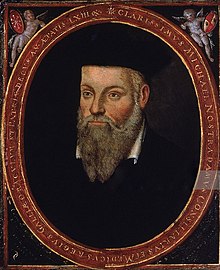Nostradamus
| Michel de Nostredame | |
|---|---|

Nostradamus: original portrait by his son Cesar
|
|
| Born | 14 December or 21 December 1503 (Julian calendar) Saint-Rémy-de-Provence, Provence, France |
| Died | 2 July 1566 (aged 62) Salon-de-Provence, Provence, France |
| Occupation | Physician, author, translator, astrological consultant |
| Known for | Prophecy, treating plague |
| Signature | |
Michel de Nostredame (depending on the source, 14 or 21 December 1503 – 2 July 1566), usually Latinised as Nostradamus, was a French physician and reputed seer who published collections of prophecies that have since become widely famous. He is best known for his book Les Propheties, the first edition of which appeared in 1555. Since the publication of this book, which has rarely been out of print since his death, Nostradamus has attracted a following that, along with much of the popular press, credits him with predicting many major world events. Most academic sources maintain that the associations made between world events and Nostradamus's quatrains are largely the result of misinterpretations or mistranslations (sometimes deliberate) or else are so tenuous as to render them useless as evidence of any genuine predictive power.
Born on either 14 or 21 December 1503 in Saint-Rémy-de-Provence, Provence, France, where his claimed birthplace still exists, Michel de Nostredame was one of at least nine children of notary Jaume (or Jacques) de Nostredame and Reynière, granddaughter of Pierre de Saint-Rémy who worked as a physician in Saint-Rémy. Jaume's family had originally been Jewish, but his father, Cresquas, a grain and money dealer, based in Avignon, had converted to Catholicism around 1459-60, taking the Christian name "Pierre" and the surname "Nostredame" (Our Lady), the saint on whose day his conversion was solemnised. The earliest ancestor who can be identified on the paternal side is Astruge of Carcassonne, who died about 1420. Michel's known siblings included Delphine, Jean (c. 1507–77), Pierre, Hector, Louis, Bertrand, Jean II (born 1522) and Antoine (born 1523). Little else is known about his childhood, although there is a persistent tradition that he was educated by his maternal great-grandfather Jean de St. Rémy — a tradition which is somewhat undermined by the fact that the latter disappears from the historical record after 1504, when the child was only one year old.
At the age of 15 Nostredame entered the University of Avignon to study for his baccalaureate. After little more than a year (when he would have studied the regular trivium of grammar, rhetoric and logic, rather than the later quadrivium of geometry, arithmetic, music and astronomy/astrology), he was forced to leave Avignon when the university closed its doors during an outbreak of the plague. After leaving Avignon, Nostredame, by his own account, traveled the countryside for eight years from 1521 researching herbal remedies. In 1529, after some years as an apothecary, he entered the University of Montpellier to study for a doctorate in medicine. He was expelled shortly afterwards by the student procurator, Guillaume Rondelet, when it was discovered that he had been an apothecary, a "manual trade" expressly banned by the university statutes, and had been slandering doctors. The expulsion document, BIU Montpellier, Register S 2 folio 87, still exists in the faculty library. However, some of his publishers and correspondents would later call him "Doctor". After his expulsion, Nostredame continued working, presumably still as an apothecary, and became famous for creating a "rose pill" that purportedly protected against the plague.
...
Wikipedia
